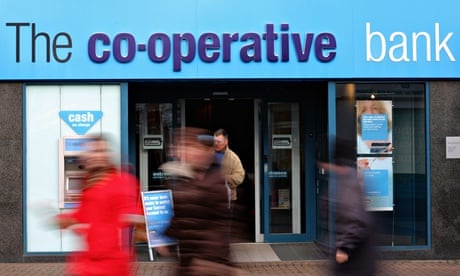The embattled Co-operative Group, still reeling from a banking scandal and preparing to lay off up to 5,000 employees, faces a new storm over plans to pay its chief executive more than £3.5m in his first year in the job, while massively boosting the salaries and bonuses of other senior staff.
The proposals will see the issue of executive pay dragged once again into the spotlight, after two leading banks last week confirmed that they were to pay hundreds of staff a million pounds or more. They also threaten to plunge the Co-op into further controversy after a disastrous recent period.
Last year it revealed a £1.5bn black hole in the finances of its banking division. The discovery was made several months before the Co-operative Bank's former chairman, Paul Flowers, a Methodist minister, was shamed for allegedly buying hard drugs, including crystal meth.
Those revelations tarnished the Co-op brand and raised questions about how and why the previous board had appointed Flowers to such an important role.
Documents marked "Private & Confidential", seen by the Observer and prepared for the group remuneration and appointments committee, refer to the significant problems the Co-op's new executive team has inherited. They suggest that the salary packages for chief executive Euan Sutherland and his fellow directors are necessary because "the [Co-op's] executive agenda is possibly the most complex one facing a large business in the country today".
Salary consultants brought in by the Co-op based the proposed remuneration packages on comparisons with FTSE 30 and FTSE 100-listed companies of a similar size to the mutualised group that is owned by its 8 million members. But the huge salary increases are likely to be seen by some as at odds with the history of the co-operative movement and its traditionally egalitarian ethos.
Under the proposals, Sutherland will be paid a base salary of £1.5m this year, plus a £1.5m retention payment. With pension contributions and other extras, such as compensation for buying him out of his previous contract, Sutherland will receive £3.66m this year. His predecessor, Peter Marks, received just over £1.3m last year.
Richard Pennycook, the chief operating officer, will receive a £900,000 salary and a retention payment of £900,000. Six other executives will be paid salaries between £500,000 and £650,000 – and the same amount in retention. In the past, senior executives of the Co-op received between £200,000 and £400,000.
It has also emerged that Rebecca Skitt, the Co-op's chief human resources officer, who joined in February 2013, left last month with a proposed pay-off totalling more than £2m.
A person familiar with the proposals said they represented a "high noon" for the Co-op. It is believed that not all of the board back the proposals, which are likely to play badly with some of the hundreds of elected members who sit on the Co-op's national and regional boards. "Many are likely to be appalled," suggested one person familiar with their thinking.
Sutherland, who became chief executive last May, has admitted that the group's full-year 2013 figures, due later this month and expected to reveal losses of £2bn, will be "pretty ugly". To sort out its finances, the Co-op is looking to sell its pharmacies and farms and make cost savings that could see between 4,000 and 5,000 staff made redundant.
Sutherland has expressed fears that the Co-op has "lost touch with its customers and members and with the communities in which it operates – we haven't been listening". He has questioned continued donations of up to £1m a year to the Labour party and a number of its MPs.
His efforts at modernising the Co-op have been treated with suspicion by some members who believe he is keen on demutualisation, a claim he strenuously denies. His supporters argue that his efforts, and those of his fellow executives, saved the bank from going under, something that would have triggered a taxpayer-funded bailout costing potentially billions of pounds.
"Last year, the Co-operative Group faced the biggest crisis in its 150-year history with the need to recapitalise its bank," said Ursula Lidbetter, chair of the Co-operative Group. "We saved the bank, without recourse to the taxpayer, and we are now embarking on the long journey to revitalise the wider group. That means reducing debt, improving performance and streamlining a business that had become grossly inefficient. It is against that backdrop that we recruited Euan Sutherland and a team with the skills and experience needed at this crucial stage in our history.
"The remuneration packages of our executives are in the middle of a range of comparable companies. This represents an increase on the pay of their predecessors to reflect the greater commercial, management and turnaround experience they are bringing to bear. Euan and his team have already made a significant contribution to the group and we are confident that they will continue to do so."
Critics question the "bomb-proof" nature of the remuneration packages, which will be paid out regardless of any turnaround in the Co-op's fortunes this year."We all want the Co-op to be strong and successful again," said Lord Oakeshott, the former Liberal Democrat Treasury spokesman and a Co-operative Bank customer. "But gigantic golden hellos for the new bosses send the wrong message to millions of loyal members, customers and staff. Of course, managers should be well rewarded – when they've turned the business around sustainably over the next five years."
Last week there was anger when it emerged that almost 500 Barclays and 75 Lloyds Banking Group staff were being paid more than £1m, sparking claims a bonus bonanza had returned to the City.





Comments (…)
Sign in or create your Guardian account to join the discussion